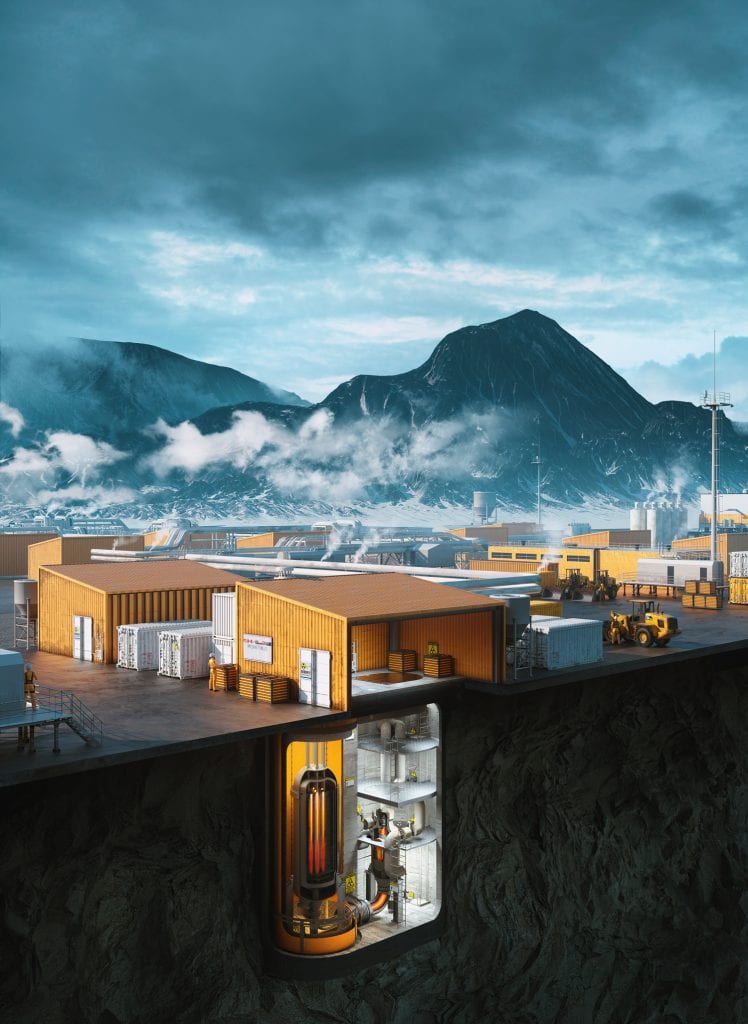Illinois University Seeking NRC License to Build Nuclear Microreactor
The University of Illinois at Urbana-Champaign (UIUC) has formally kicked off a pioneering project to partly re-power its 85-MW Abbott cogeneration plant with an Ultra Safe Nuclear Corp. (USNC) Micro Modular Reactor (MMR) Energy System.
UIUC on June 28 said it submitted a letter of intent to the U.S. Nuclear Regulatory Commission (NRC) to build a “research and test reactor facility,” at the site of its 1941-built Abbott campus power plant that will integrate an MMR. Submission of the letter of intent marks the first formal step toward pursuing a construction permit, and ultimately obtaining an operating license. It follows two years “engaging with the university and surrounding community; local, state, and federal governments; and potential industry partners,” the university said in a statement.
The development is also notable for Seattle-based USNC because it marks the advanced nuclear technology developer’s foray into the U.S. licensing arena, where several other non-light water reactor designers are already engaging with the NRC. USNC is already making headway in Canada. In May, the company entered formal licensing review for a 5-MWe (15-MWth) MMR with the Canadian Nuclear Safety Commission as part of a proposed project spearheaded by Global First Power to build and operate a full-scale MMR reactor at Chalk River Laboratories in Ontario.
“The University of Illinois provides a unique environment for innovation in research and education combined with the opportunity of commercial-level implementation on a scale that is ideal to our microreactor product,” said Francesco Venneri, USNC’s CEO, in a statement. “We expect the licensing process to be exceptionally comprehensive and open to public review and comment, exactly as it should be.”
A Power and District Heat Demonstration
USNC offers the MMR as part of an energy system that integrates one or several standardized micro high-temperature gas-cooled reactors (HTGRs) that it says can produce between 10 to 100 MWe of power or process heat with a heat storage unit. A standard MMR unit uses USNC’s tristructural-isotropic (TRISO) Fully Ceramic Microencapsulated (FCM) fuel (which it developed with Idaho National Laboratory and Oak Ridge National Laboratory) to generate between 15-30 MWth at a temperature of 650C, the company said. The system’s heat storage facility—a molten salt energy storage unit—essentially “decouples the nuclear system from the power conversion system, greatly simplifying operations and allowing flexible use of the energy generated,” it said.

Under the project, USNC will collaborate with the university’s Grainger College of Engineering (and its Department of Nuclear, Plasma, and Radiological Engineering) to deploy the new reactor system. If successfully completed, the project will provide a “zero-carbon demonstration of district heat and power to campus buildings as part of its green campus initiative,” the university said. “The project team aims to demonstrate how microreactor systems integrate with existing fossil fuel infrastructure to accelerate the decarbonization of existing power-generation facilities.”
The Abbott plant currently provides nearly half of UIUC’s power and nearly all its heat via two gas turbines, two heat recovery steam generators, and three steam turbine generators. According to UIUC, the plant was sited near a main railroad line to allow for quick delivery of coal to feed its original three coal-fired boilers. Following numerous additions and alterations, Abbott is today capable of using natural gas, coal, and fuel oil for a maximum steam production of about 800,000 pounds per hour.
Wide Research Opportunities
But for UIUC, the project will also serve as a valuable workforce training tool for “a new generation of nuclear scientists, engineers, and operators,” it said. It described “a diverse set of opportunities for research that will span the MMR energy system’s “instrumentation and control, multi-physics validation, reactor prototype testing, micro-grid operations, cybersecurity, hydrogen production for transportation and energy storage, and other energy-intensive, high-value products.”
“Universities have nearly 80 years of pioneering nuclear reactor technology and safely operating nuclear reactors. UIUC’s TRIGA reactor operated for 38 years with a site license in the heart of campus before decommissioning and returning the site to greenfield,” said Rizwan Uddin, Department Head of Nuclear, Plasma, and Radiological Engineering. “Next-generation energy research facilities are critical to training the emerging clean-energy focused workforce.”
—Sonal Patel is a POWER senior associate editor (@sonalcpatel, @POWERmagazine).